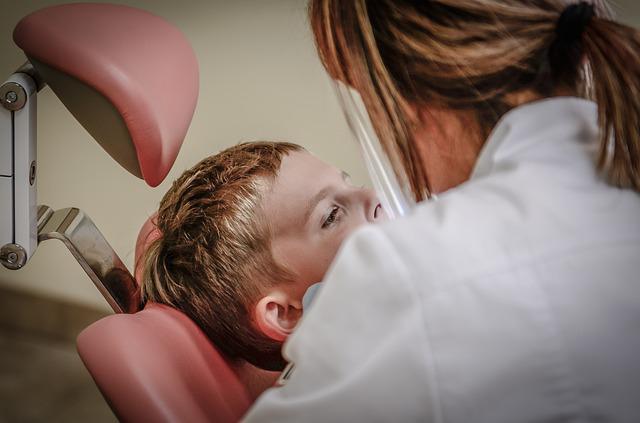Pediatric Dentist – How to Hire the Right Child Dentist
Kristin’s
four-year-old daughter was crying endlessly pointing toward her mouth. Unable
to understand, she took her to a pediatrician who after examining referred her
to a pediatric dentist. After treatment, her daughter is feeling relieved. As
per a report published in Technavio – a market research company – the global
physiotherapy market will grow by USD 6 billion during 2022-2026.
Before
proceeding further, let us understand what a pediatric dentist is.
What
is Pediatric Dentist – Meaning and Definition
A
pediatric dentist is a dentist who specializes in providing dental care to
children from infancy to teenage. Also called pedodontists, they are trained to
look after a child’s teeth, gums and oral cavity. The discipline of treating
child dental issues is called pediatric dentistry or pedodontics.
As
per United States’ education system, pedodontics or pediatric dentistry is one
of the important parts of pediatric surgery.
Here
it would be relevant to explore the dictionary meanings of pediatric dentist or
pedodontist. Meriam Webster dictionary
defines a pedodontist as
a specialist who provides dental care to children.
Different
Branches of Dentistry
Pediatric
dentistry is one of the nine specialties of dentistry. You have to complete
Doctor of Dental Surgery (DDS) or Doctor of Dental Medicine (DMD) before doing
one of these specialties. These specialties are as follows.
-
Endodontics
- Oral Surgery
- Prosthetics
- Preventative Care
- Pediatric dentistry
- Orthodontics
- Restorative Dentistry
- Periodontics
Also Read
Emergency Dentist – Understanding A 24-Hour Dentist Better
Role
of Pediatric Dentists – What Do They Do
A
pediatric dentist performs a variety of roles to ensure the well-being of the
teeth, gum and oral cavity of your child.
Here are the major roles they play.
- Examining teeth, gum and oral cavity
- Cleaning teeth
- Dental caries or tooth decay
- Correction and straightening of teeth
- Treatment of dental injuries
- Tooth feeling
- Dental X-rays
- Providing fluoride treatment if needed
- Training parents on how to handle thumb-sucking or pacifiers.
- Suggesting choice of food during the eruption of teeth.
- Treatment of pediatric gum disease
- Handling emergency cases like a dental fracture
Reasons
to Take Child to a Pediatric Dentist
It
is advised that you should take your child to a pediatric dentist even if he
has no apparent dental issues. There are a number of reasons to do so.
- There
may be underlying issues that may not be evident. A pediatric dentist can
identify and treat them in infancy. - A
routine checkup is essential to keep your child’s teeth in good health. - A
pedodontist is well trained in child psychology which enables him to
communicate with children better. - Some
dental issues like displaced teeth can be better treated at an early stage. - A
child dentist can educate you and your child about good oral hygiene habits. However, they also have a specialist dental hygienist. - A
pediatric dentist is well equipped to find out whether your child has a chance
of developing a cavity. If yes, how can it be prevented? - Without
good oral health, your child may not be able to eat properly, and the condition
may lead to malnutrition. - Children
aged three and below should be taken to a pediatric dentist every three months.
After the eruption of all teeth, he should visit twice yearly.
Difference
Between General Dentist and Pediatric Dentist
Most
people take their children to a general dentist. Very few of them know that
their child needs attention from a specialist is a pediatric dentist. Here we
try to differentiate between a general dentist and a pediatric dentist.
Catering
to Different Age Groups
General
dentists cater to people of all ages while a pediatric dentist treats children
from infancy till they turn adults.
Training
There
is a difference in education and training as well. While general dentists do
Doctor of Dental Surgery (DDS) or Doctor of Dental Medicine (DMD), a pediatric
dentist does a two-year-long specialization in pediatric dentistry after these
courses.
A
child’s oral cavity is different from an adult. Some issues like tongue ties,
tongue thrusts and baby bottle tooth decay are specific to children only. A
child dentist is better equipped to handle all these.
Apart
from dentistry they also have a good understanding of psychology that helps
them handle children.
Equipment
The
tools for treating the child’s teeth and oral cavity is different from those of
adults. These tools are designed to suit the children’s requirements. A general
dentist may not be trained enough to handle these tools and instruments.
Experience
Experience
is another thing where general and pediatric dentists are different. They get
2-3 years of rigorous training that enable them to handle difficult kids. They
know how to immediately make a rapport with children of different age groups.
Their
experience also helps them find any irregularity in their teeth. If they find
any irregularity, they immediately make a treatment plan or send it to the
right doctor.
Another
thing that sets them apart from general dentists is their ability to handle
patients with special needs.
General
dentists also have experience but their experience is of a different kind.
Environment
The
environment at the clinic also plays a pivotal role. The clinic of a pediatric
dentist is designed in a kid-friendly way. Right from furniture to décor,
everything is designed to make kids comfortable and at home during their visit
to the dentist’s office.
How
To Select the Right Pediatric Dentist for Your Child
Owing
to the importance of a child dentist, you might be looking for one who can
ensure better care for your child. Here we offer valuable tips on how to select
the right pediatric dentist for your child.
Recommendation
from Parents
Most
parents who have a kid in their home know a pediatric dentist as they often
have to take them for a checkup. These parents can share their experiences and
help you find the right pedodontist. They can tell you a lot about the
environment, comfort level, and amenities and services available.
A
large number of these parents or guardians have talked to the dentist and can
say you how comfortable he is with the children.
Qualifications
Before
finalizing a pediatric dentist for your child, you should know about their
qualification. You should know whether he is qualified enough to handle dental
health issues in children. You should check whether the doctor has done
specialization in pediatric dentistry after completing Doctor of Dental Surgery
(DDS) or Doctor of Dental Medicine (DMD). You should also check if they have
passed the American Board of Pediatric Dentistry (ABPD) or American Board of Orthodontics (ABO) examination. ABO examination is only
necessary if you are trying to hire orthodontics for your child.
Know
their Training institutions
You
should know where your prospective pediatric dentist got trained. Every
institution is different and so is its training. The kind of institutions they
have attended have a direct bearing on their training. Some institutions are better known for
offering dental care to children with special needs. So, if your child has
special needs, you should prefer to visit a pediatric dentist who has attended
one such institution.
Seek
an Initial Consultation
Instead
of starting an examination of your child on the first appointment, you should
seek an initial consultation where your child can get accustomed to the office
of the dentist and get comfortable with him. Being a parent, you can also know
about the dentist and check if he is the right fit to look after the overall
oral health of your child.
Behavior
is Important
The
behavior of the pediatric dentist, hygienists, receptionist and other staff
towards your child could also be a benchmark for selection. Are they able to
communicate with your child? Do they treat your child with politeness? Are they
able to make your child comfortable? These things should be considered while
finalizing a pediatric dentist.
Look
for Preventive Care
When
it comes to treatment there is a universal truth that says prevention is better
than cure, and pediatric dentistry is no exception. You should give preference
to a dentist who is known for offering preventive care. Preventing a dental
disorder in beginning is highly effective.
Associations
are important
Industry
associations impart credibility to pediatric dentists. Most pediatric dentists
are associated with the American Dental Association (ADA)
and the American Association of Pediatric Dentistry (AAPD). Apart from these,
there are several local bodies that offer affiliation to pedodontists. Check if
your dentist is associated with any such body.
Suitability
for You
If
you find that a doctor is good in skill and experience, you should also check
his suitability for you. Check him on the following factors.
Location
The
location of your pediatric dentist is also an important factor. What if his
clinic is far away from your home? Going to a very far location with your child
is difficult and it may take a toll on your work life. The nearer the location,
the better it is.
Work Hours
The
work hours of the pediatric dentist should also suit you. You have to take your
child to him multiple times. So, his working hours must suit you. If his
working hours clash with your office and your child’s school, then it is the
right time you should start looking for other options.
Fee
Consultation
fee is another consideration when choosing a pediatric dentist. How much does
he charge for his services? Is he affordable? Are you comfortable paying him?
These things should be taken into account.
Insurance
Your
family might be covered with medical insurance that lowers the financial
burden. People who are not that resourceful are covered under Medicaid, the
medical assistance scheme of the US government. If you are one of them, look
for a pediatric dentist that accepts Medicaid.
Online
Reviews
Today
customers are very vocal about the kind of experience they have gotten and they
don’t mind sharing it with others. There are several websites including Yelp
and Google where you can find such reviews. But here is a word of caution.
Every website is not worth believing as some websites manipulate user reviews
and ratings for money. Don’t trust them.
Some
reviewers also provide their emails and you shouldn’t shy away from reaching
them to establish whether the information given is true.
Also Read
Qualities of a Dentist – 30 Qualities that Make Him Apart
Interesting
Facts About Children Oral Health
- Cavities
were found in at least one of the primary teeth in the children aged between 6
and 8. - Cavities
were found in at least one of the permanent teeth in adolescents aged between
12 and 19. - Children
aged between 5 and 19 from low-income groups are twice more likely to develop
cavities than children of the same age group from high-income group. Cavities
were found in 25% of children in the low-income group and 11% of children in
highl income group. - Cavities
or caries were found in the primary teeth of 42% of children aged between 2 and
11. - Tooth
decay is more common in children from black, Hispanic and lower-income
families. - Tooth
decay is a major chronic health condition for children in America say American
Dental Association. - Around
1 million children suffer from life-threatening diseases that could have been
detected by a pediatric dentist at an early stage. - A
pediatric dentist can help find dysfunction in the airways of children.
Pediatric
Dentist Frequently Asked Questions (FAQ)
When
should I first take my child to a dentist?
You
should take your child to a pediatric dentist at 6 months.
What
is another name of the pediatric dentist?
Pediatric
dentists are also referred to as pedodontists.
What
to bring during your first visit to a pediatric dentist?
You
should be prepared while visiting a pediatric dentist for the first time. Here
are the essentials you should bring along.
You
should bring along the primary caregiver along with you as she understands the
child better.
You
should bring your medical insurance or Medicaid if your pediatric dentist
accepts Medicaid.
You
should also bring the medical documents related to your child.
What
are the main roles of pediatric dentists?
A
pediatric dentist is entrusted with several different roles include.
- Ensuring
good oral health in children - Detecting
oral diseases and treating them - Training
kids and parents for developing good oral hygiene habits - Identifying
deforming in teeth so that they can be referred to pediatric orthodontics
When
should a child first visit a pediatric dentist?
The
child should first visit a pediatric dentist at the age of 6 months of coming
in first teeth.
What
is the significance of pediatric dentistry?
We
all know that child’s teeth are not permanent and they will fall out soon. Even
then it should get proper attention as it ensures oral hygiene of the child. In
the case of permanent teeth, he treats the issues and counsels parents and
kids.
What
skills do you need to be a pediatric dentist?
Pediatric
dentistry is a specialization course. You have to do Doctor
of Dental Surgery (DDS) or Doctor of Dental Medicine (DMD) before doing a
specialization in pediatric dentistry. There are 9 specializations of dentistry
and pediatric dentistry is one of them.
What
is pediatric dentistry?
Pediatric
dentistry is one of the nine specializations in dentistry that deals with the
oral health of children from infancy to teenage. Pediatric dentistry is also
referred to as pedodontics.
What
is it like being a pediatric dentist?
A
pediatric dentist or pedodontist is a dentist that specializes in dealing with
the oral health of children from infancy to the age of 18.
What
are the benefits of visiting a pediatric dentist?
There
are several benefits attached to visiting a pediatric dentist. These are as
follows:
- Early
detection helps fix the problem in infancy - Specially
trained for taking care of children’s oral health - Specialized
equipment to suit children’s oral cavity - Trained
to counsel children and parents to adopt healthy oral health habits - Trained
in psychology to handle difficult children - Evaluating
dental growth and taking corrective measures - A
dental clinic specifically designed for children
What
to do if my child’s teeth are knocked out?
There
is no need to get panic. If it is a permanent tooth, try to find it, keep it in
a glass of milk, and rush to a dentist. Before going there call your dentist
and tell the situation so that your dentist can get ready for an emergency. A
dentist is trained to handle a situation like this.
My
child is visiting the dentist for the first time and as a parent we are
worried.
There
is no need to worry as pediatric surgeons are qualified and trained enough to
handle the dental care needs of children of all age groups. They also know how
to handle children with special needs.
If you are still worried, you should take a pre-appointment and get
acquainted with the environment. You can also check the photo gallery given on
the dentist’s website. Some pediatric dentists also offer virtual tours on
their websites.
My
child doesn’t eat a healthy and balanced diet. Should I get worried?
As
per American Academy of Pediatric Dentists (AAPD) there is no need to worry. After
all you can’t expect perfection from kids. It is OK if he eats things in a
moderate amount. You should motivate him to brush and floss regularly,
especially after sweet treats. Keep giving him a balanced diet and if there is
any issue take him to a pediatric dentist.
What
are the major treatments pediatric dentists offer?
Pediatric
dentists offer an array of treatment options. Important among them are listed
below.
- Dental
cleaning - Fluoride
treatment - Feeling
cavities - Early
orthodontic treatment - Teeth
extraction if necessary - Pulp
treatment - Sealants
to stop teeth decay - Space
maintainers - X-rays
of teeth - Crowns
- Tooth
feelings for cosmetic purposes
What
is oral sedation in pediatric dentistry?
A
pediatric dentist uses oral sedation when the child is nervous during
treatment. This sedation is administered through the mouth or nose which makes
child a little drowsy or relaxed. It makes completing the procedure easy for a
pediatric dentist.
When
should parents start brushing their child’s teeth?
Like
adults, children’s teeth are also prone to decay. It can attract plaque, and
tartar and be a place for bacteria to thrive.
Parents
can start brushing their kid’s teeth as soon as it comes out. Generally, teeth
start appearing around the 6th month.
You
should start cleaning their teeth with soft sanitized cloth, wipes, or soft
toothbrushes. As your kid is very young, it is wise to avoid toothpaste.
You
have to keep supporting your children with brushing till they attain the age of
8. Brushes of different shapes and features including electric brushes are
available in the market and you should buy one as per your child’s pediatric
dentist’s recommendation.
Why
baby teeth are so important even when we know that they will soon fall out?
Despite
the fact that baby teeth don’t have a long life and they will fall soon, they
are important. The reasons are as follows.
- Teeth are essential for chewing. So, they
add to a child’s nutrition and growth. - Baby teeth create space for permanent
teeth. - They also play a good role in speaking of
a child. Some letters are pronounced with the support of teeth. - They give the jaw a shape.
Also Read
Parenting Manual – Tips to Make You A Better Parent








